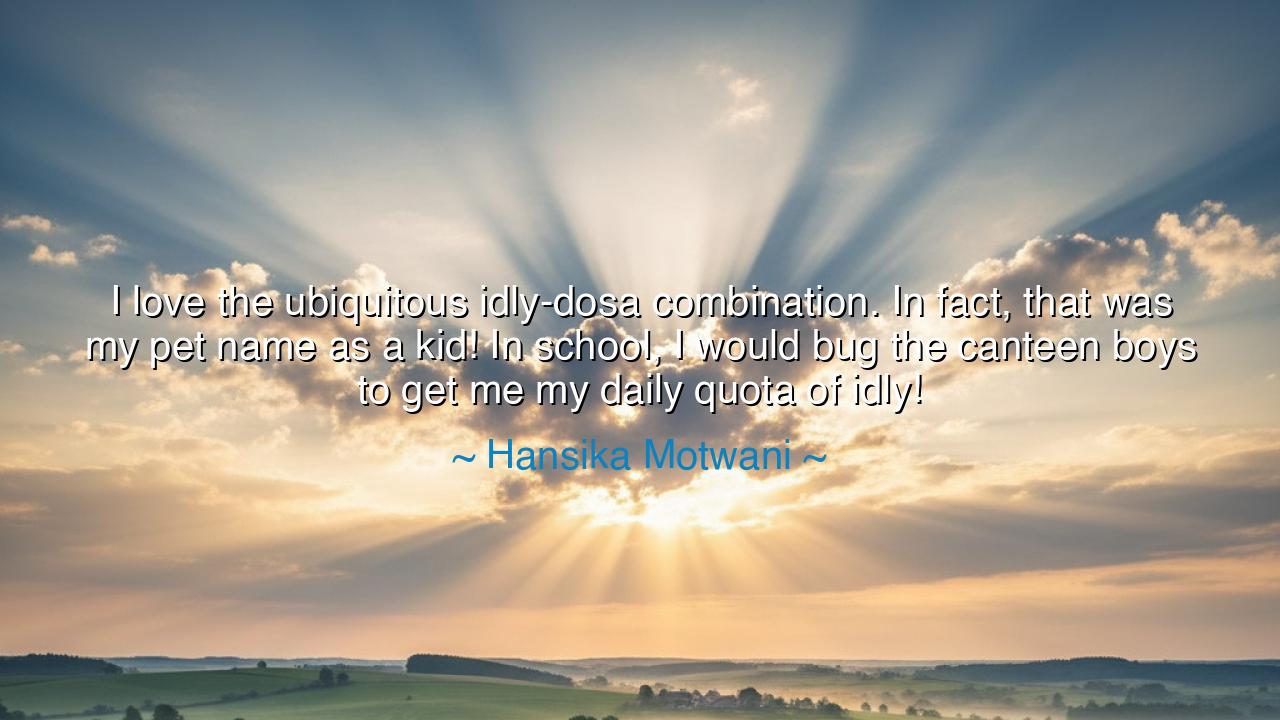
I love the ubiquitous idly-dosa combination. In fact, that was
I love the ubiquitous idly-dosa combination. In fact, that was my pet name as a kid! In school, I would bug the canteen boys to get me my daily quota of idly!






In the words of Hansika Motwani: “I love the ubiquitous idly-dosa combination. In fact, that was my pet name as a kid! In school, I would bug the canteen boys to get me my daily quota of idly!” At first, these words seem playful, a lighthearted memory of childhood. Yet when listened to with the ears of wisdom, they reveal something deeper: the power of food, memory, and identity to bind us to our roots and to shape who we become. For in the simple joy of idly and dosa, there is more than flavor—there is culture, belonging, and the laughter of innocence.
The idly-dosa is no ordinary meal. It is the nourishment of millions, the humble yet enduring gift of South Indian tradition. Steamed rice cakes and golden crepes, eaten with chutney and sambar, are not just sustenance but symbols of simplicity, health, and comfort. When Motwani speaks of this combination as her pet name, she is not only recalling a childhood fondness but also honoring a cultural heritage carried in the rhythm of daily meals. Just as the ancients gathered around bread or rice, so too does this pairing embody the spirit of family, school days, and community.
Her story of pestering the canteen boys for her daily quota is more than a memory of appetite—it is a story of persistence, joy, and the unashamed celebration of small pleasures. Children, unburdened by pride, will declare what they love boldly and pursue it with energy. In this, there is wisdom: to know what gives you joy, to pursue it wholeheartedly, and to weave it into the fabric of daily life. Many adults lose this innocence, hiding their loves behind the mask of dignity. But Motwani’s words remind us that in childlike enthusiasm lies a kind of truth: that joy is not to be delayed, but savored in the moment.
History, too, offers echoes of this wisdom. Consider the Roman love for bread and olives, or the Japanese reverence for rice. Great civilizations were bound not only by politics and conquests but by the shared meals that gave life rhythm and stability. A soldier returning from battle longed for the familiar taste of his homeland. A student learning in the schools of philosophy found grounding in the food that reminded him of childhood. Food, then, is more than fuel; it is memory, identity, and the thread that ties generations together.
Motwani’s delight in her daily idly also speaks of the human need for routine—a rhythm that steadies us amidst the chaos of life. Just as monks rise to chant at dawn, just as farmers follow the rising and setting of the sun, so too do schoolchildren look forward to the meals that punctuate their day. A simple idly becomes not just nourishment but an anchor, a small ritual that reminds us that life, though filled with challenges, can be sweetened by small and dependable joys.
The meaning of this quote is, therefore, twofold. On the surface, it is about food and childhood. At its heart, it is about belonging, identity, and joy. It teaches us that even the simplest pleasures can hold profound meaning, that our heritage is preserved not only in books and monuments but in the meals we eat, and that the laughter of childhood can echo throughout life if we do not forget it.
The lesson for us is clear: cherish the small rituals of your life, whether it is the food you love, the song you hum, or the place you visit. Do not dismiss them as trivial, for they are the threads that bind your days into a tapestry of meaning. In practice, honor your roots by remembering the foods and traditions of your childhood. Share them with others, as stories and as meals. Let them remind you that happiness is not always in the grand achievements, but in the simple joys pursued with love.
Thus, Motwani’s words, though playful, become a timeless teaching: find joy in the simple, honor your roots, and never be ashamed of what makes you smile. For in the taste of idly and dosa, in the laughter of a schoolgirl asking for her daily share, lies the eternal truth that life’s greatest treasures are often its simplest ones.






AAdministratorAdministrator
Welcome, honored guests. Please leave a comment, we will respond soon